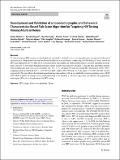Development and Validation of a Sociodemographic and Behavioral Characteristics‑Based Risk‑Score Algorithm for Targeting HIV Testing Among Adults in Kenya
Publication Date
2020Author
Hellen Muttai · Bernard Guyah · Paul Musingila · Thomas Achia · Fredrick Miruka · Stella Wanjohi · Caroline Dande · Polycarp Musee · Fillet Lugalia · Dickens Onyango · Eunice Kinywa · Gordon Okomo · Iscah Moth , Samuel Omondi · Caren Ayieko · Lucy Nganga Rachael H. Joseph · Emily Zielinski‑Gutierrez
Metadata
Show full item recordAbstract/
To inform targeted HIV testing, we developed and externally validated a risk-score algorithm that incorporated behavioral
characteristics. Outpatient data from fve health facilities in western Kenya, comprising 19,458 adults≥15 years tested for
HIV from September 2017 to May 2018, were included in univariable and multivariable analyses used for algorithm development. Data for 11,330 adults attending one high-volume facility were used for validation. Using the fnal algorithm, patients
were grouped into four risk-score categories:≤9, 10–15, 16–29 and≥30, with increasing HIV prevalence of 0.6% [95%
confdence interval (CI) 0.46–0.75], 1.35% (95% CI 0.85–1.84), 2.65% (95% CI 1.8–3.51), and 15.15% (95% CI 9.03–21.27),
respectively. The algorithm’s discrimination performance was modest, with an area under the receiver-operating-curve of 0.69
(95% CI 0.53–0.84). In settings where universal testing is not feasible, a risk-score algorithm can identify sub-populations
with higher HIV-risk to be prioritized for HIV testing.

